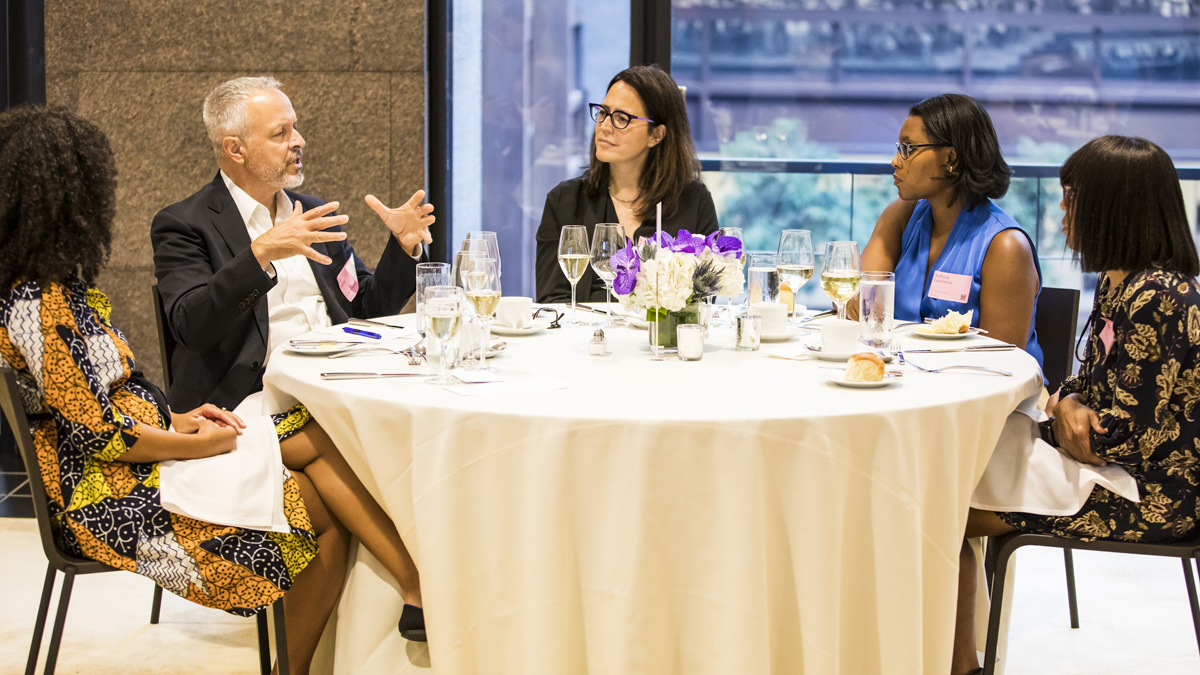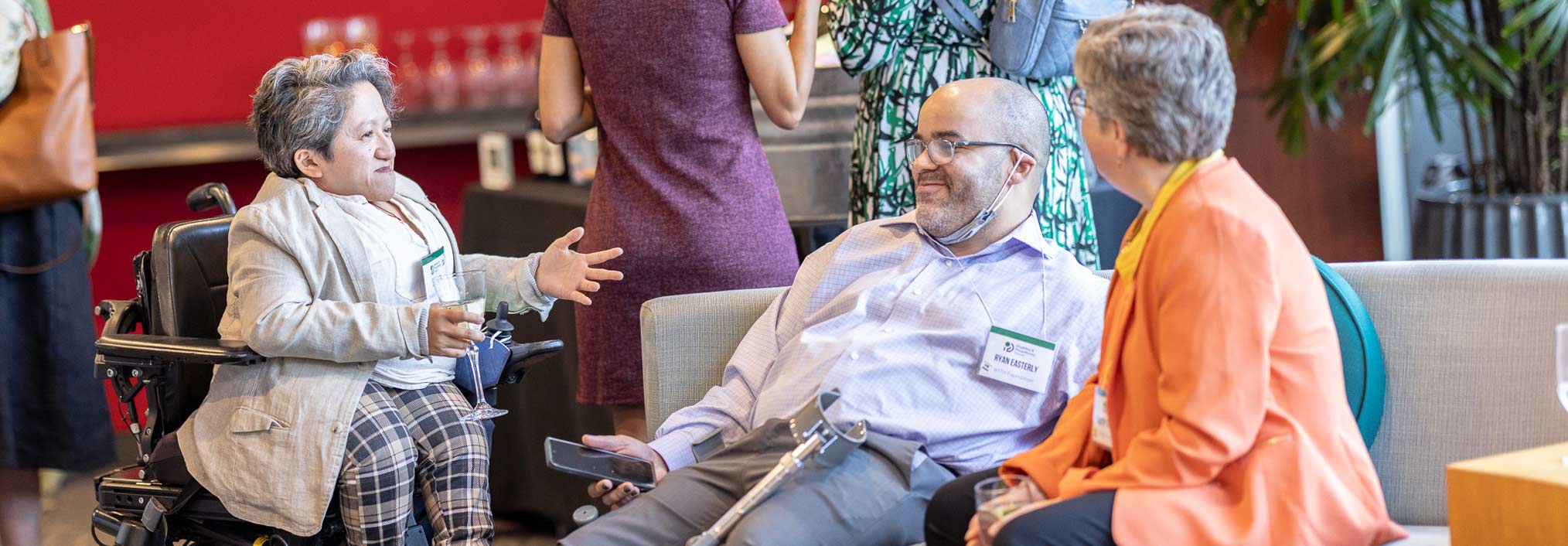Disability & Philanthropy Forum guides funders, creates community for staff with disabilities, and drives broader change.
In the meetings that are a recurring part of her daily schedule, disability rights leader Sandy Ho often finds herself the only person in the room who openly identifies as having a disability.
That needs to change, she said.
“We need to hire more people with disabilities across every area of grantmaking,” said Ho, executive director of the Disability & Philanthropy Forum, which works to strengthen disability inclusion throughout funding organizations. “Whether in tech or climate change or civic engagement, these perspectives can only make philanthropy more accountable and also better in actually moving us forward.”
Ho, who began leading the Forum in June, described the organization’s focus on disability justice as “helping philanthropy to embrace disability as its own civil rights and social justice movement, rather than the typical medicalized, charity funding model.”
“It’s disability as a power-building movement,” Ho added.
Founded in 2019, the Forum’s work centers on helping funders recognize that disability inclusion should be intrinsic to their work as it promotes broader inclusivity. To achieve its goals, the Forum provides technical support, educational programming, and peer-to-peer networking to funders while also working with disability justice communities to make change.
The Forum’s work centers on helping funders recognize that disability inclusion should be intrinsic to their work as it promotes broader inclusivity.
And last year, the Forum produced a report on the state of disability grantmaking.
“[This is] the first time any significant substantive review of disability grantmaking among U.S. foundations had been done,” said Emily Harris, who served as the Forum’s executive director before retiring in June 2024. “It was very depressing but not surprising at all.”
Among the findings: U.S. funders’ disability-related grants totaled slightly more than $755 million, representing only 2 percent of total grants. Yet people with disabilities make up 26 percent of the U.S. population.
The analysis also found that funding for disability rights and social justice represented one tenth of a percent of philanthropic grantmaking, while 94 percent of the grants were focused on disability services and support.
That discrepancy between support for disability services and disability rights indicates that philanthropy needs “to move from paternalism to seeing disabled people as powerful,” said Rebecca Cokley, program officer of the U.S. Disability Rights Program at the Ford Foundation.
Milestones
The Forum’s efforts are at the fulcrum of that issue and represent philanthropy’s shift. In the Forum’s first year, leaders from several foundations created the Presidents’ Council for Disability Inclusion in Philanthropy to focus on disability inclusion, equity, and justice.
A crucial step came in 2020, when the Council supported the creation of the Disability Inclusion Fund (DIF) for grantmaking. Since then, DIF has moved more than $14 million to 72 disabled-led organizations.
Housed at Borealis Philanthropy, DIF is the only U.S. grantmaker using a participatory model to support those grassroots, disabled-led organizations working in areas such as climate change adaptation, the arts, policy, and community organizing, DIF Program Director Nikki Brown-Booker said. This year DIF was able to make grants to 15 organizations. More than 200 applied.
“That speaks to the need that’s out there,” Brown-Booker said.
She added that becoming more accessible to disabled-led grantees means changing some philanthropy grantmaking practices. Explicitly welcoming disability justice proposals from those with disabilities would be one welcome change, Brown-Booker said, as would allowing grant requests via video or phone.
Philanthropies are ready to change.
One year after the DIF’s creation, the Disability & Philanthropy Forum established the Disability Inclusion Pledge, which calls for foundations to take specific steps advancing disability inclusion. Those include training, inclusion audits, grant-making goals for disability inclusion, and accessibility measures. More than 80 foundations, including the MacArthur Foundation, have signed the pledge.
More than 80 foundations, including the MacArthur Foundation, have signed the pledge.
In addition, the Forum created an affinity group for people with disabilities working in philanthropy and continues to perform extensive education and outreach to philanthropic leaders.
‘At A Unique Nexus’
Ho’s broad experience is ideal for leading the Forum, her predecessor Harris said. A policy researcher, community organizer, and member of the inaugural Obama Foundation USA Leaders cohort, Ho was director of the Disability Inclusion Fund before taking the helm at the Disability & Philanthropy Forum.
“Sandy really centers the perspective and leadership of queer people of color and disabled people of color,” Harris said. “She is a researcher who understands deeply the importance of data, how to evaluate success.”
“Because of her work with the fund and incredible network in the disability community, she sits at a unique nexus of philanthropy and the disability justice community,” Harris added.
Ho assumes leadership at a time when advocates are emphasizing that people with disabilities must be included in social justice work, including eliminating poverty, food insecurity, and gender-based violence.

Participants share ideas on making philanthropy more disability inclusive at the Disability & Philanthropy Forum annual meeting. Credit: Kisha Bari
“Philanthropy needs to really understand that disability intersects with every part of the work that they’re doing,” Brown-Booker of the Disability Inclusion Fund said. “They just need to see disability beyond direct service and research, which is what traditionally philanthropy has funded.”
And disability advocates note that innovations driven by disability justice benefit a wide swath of the population. Examples include curb cuts on sidewalks that ease the movement of strollers, grocery carts, and bikes; remote work; captions for communications platforms such as Zoom; and speech-to-text software.
Disability advocates note that innovations driven by disability justice benefit a wide swath of the population.
For Ho, it remains important that people with disabilities and lived experience guide foundations and organizations as they work to address social justice issues.
Although philanthropy has a distance to travel as it makes up for lost ground in the disability rights movement, Ho is encouraged by the direction it is moving since the Forum was established five years ago.
“I think I’ve seen a slow and gradual shift towards this model,” she said, “in which power is not just held by the decisionmaker but shared.”
From 2020-2024, MacArthur has provided a total of $1.7 million of support to the Disability Inclusion Fund at Borealis Philanthropy and Proteus Fund, which is the fiscal sponsor of the Disability & Philanthropy Forum.




